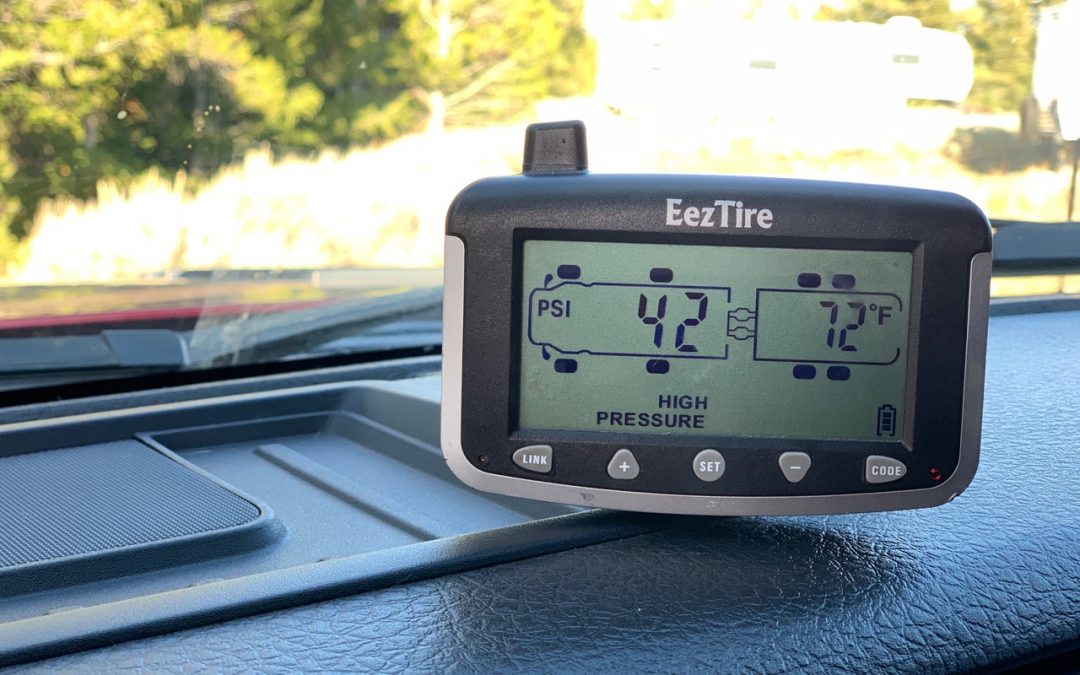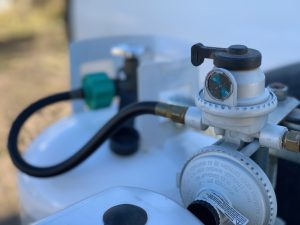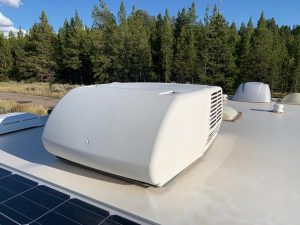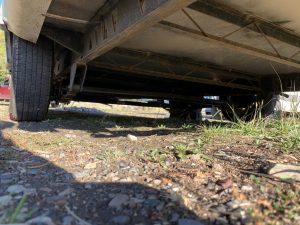“Keeping your rig in tip top shape means keeping it maintained. An RV is a rolling home on wheels. Wheels make it more susceptible to wear and tear as well as additional damages. Here are some things you should regularly check and maintain:
1. Tires
Your RV is nothing without tires! Tires are the first defense to keeping you safe while rolling down the highway. It’s essential to have a tire pressure monitoring system (TPMS) to prevent blowouts and to monitor for any slow leaks. Even if you have a TPMS, we still suggest manually checking your tire pressure before each trip.
2. Seals
The #1 killer of RVs is water damage. The only way to prevent leaks is to check all of your seams on a regular basis. We recommend at least once every three months (at the least) to carefully inspect all seams, especially the ones on your roof.
3. Refrigerator
Hopefully you already know that it’s essential to keep your RV level while your RV absorption refrigerator is running. Keep it less than two degrees off kilter or it could catch fire. Make sure the fridge vent on your roof (or at the top of your RV side wall) is clear and no critters get inside to nest. The back side panel of your fridge should also be kept clean. Once a year, clean the burner assembly by blowing it out with compressed air.
4. LP System
Your LP system can develop leaks in many places. It’s a good idea to check all accessible fittings before a trip. Grab a spray bottle and fill it with some dish soap. Open your LP tanks to allow pressure and LP to fill the lines. Spray the soapy water around any fitting areas and check for bubbles. Replace hoses where needed.
5. AC System
Your AC system needs a few things to make sure it stays in working order. Get on the roof and check that the cover is not broken or cracked. Rainwater and snow could otherwise get in and shorten the lifespan of your AC. While the cover is off, make sure there are no nests of any kind inside your AC unit. Check all the seals to prevent leaks, and blow out any debris from the area. Your fins should all be straight. If any are bent, straighten them out to the best of your ability.
6. Furnace
Your furnace has LP attachments. Make sure you test these attachments when you check your LP system for leaks. Remove the vents and make sure once again that there are no new occupants or signs of critters occupying the space. Soot showing up around the exhaust vent is a sign of incomplete combustion. If you find soot, get your furnace checked out by an RV professional immediately. Check your carbon monoxide detector before using your furnace! Keep all ducts free from obstruction or blockage.
7. Water Tank
Always keep an eye out for leaks, as water is the #1 killer of RVs. You will need to disinfect your water tank periodically. If you are full-time, do this at least once a year. Bleach is commonly used to disinfect a tank and the lines. To disinfect, completely drain your water heater and your water tank. Close your drain points. Use 1/4 cup of bleach for every 15 gallons of water. Combine the bleach with water and pour it into your tank then fill the tank completely with fresh water. Turn your pump on. Open ALL faucets in your RV. Don’t forget to turn on the hot faucets as well as the cold faucets.
Let the solution sit for 12 hours. Drain and refill with fresh water. Flush that water and refill again until you no longer smell bleach when you open water lines. Some people use vinegar to help eliminate the bleach smell. Now your tanks have been disinfected!
 8. Undercarriage
8. Undercarriage
It’s a good idea to crawl under your trailer once every few months to look for anything out of the ordinary. Rust, loose parts, cracked steel, critter entry points, and broken or loose wiring are a few things that may need to be corrected.
9. Batteries
Your batteries will need no maintenance if you are fortunate enough to have lithium or another maintenance free battery type. But if you have plain old lead-acid batteries, you should be maintaining them. Check your water levels once every 4 weeks. If you find that you never have to add water, you can probably stretch it out to every 8 weeks. Refill with distilled water if you find a low cell.
Your lead acid batteries should never be allowed to get below a 50% charge. Doing so even a few times can greatly shorten their life.
Conclusion
RV maintenance isn’t super time consuming, but it is important. Doing these little periodic checks can save you a bunch of time and hassle. We want you to stay safe and comfortable on the road, so DO these things, will ya? Love ya, and we will see you down the road!”
Kelly Beasley
Camp Addict Co-Founder
CampAddict.com
RvChickadee.com
Author Bio: Kelly Beasley is co-founder of CampAddict.com and loves sharing her enthusiasm for the RVing lifestyle. As a full-time RVer since May 2015, Kelly’s playful writing style helps make learning about the sometimes dull subject of RV products a bit more interesting.




 8. Undercarriage
8. Undercarriage
